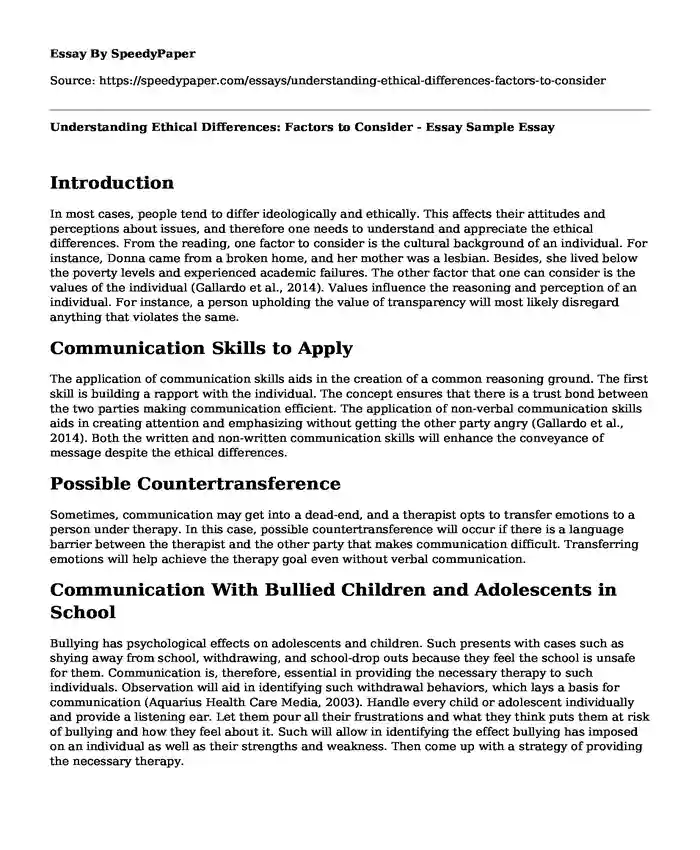
| Type of paper: | Essay |
| Categories: | Ethics |
| Pages: | 3 |
| Wordcount: | 626 words |
Introduction
In most cases, people tend to differ ideologically and ethically. This affects their attitudes and perceptions about issues, and therefore one needs to understand and appreciate the ethical differences. From the reading, one factor to consider is the cultural background of an individual. For instance, Donna came from a broken home, and her mother was a lesbian. Besides, she lived below the poverty levels and experienced academic failures. The other factor that one can consider is the values of the individual (Gallardo et al., 2014). Values influence the reasoning and perception of an individual. For instance, a person upholding the value of transparency will most likely disregard anything that violates the same.
Communication Skills to Apply
The application of communication skills aids in the creation of a common reasoning ground. The first skill is building a rapport with the individual. The concept ensures that there is a trust bond between the two parties making communication efficient. The application of non-verbal communication skills aids in creating attention and emphasizing without getting the other party angry (Gallardo et al., 2014). Both the written and non-written communication skills will enhance the conveyance of message despite the ethical differences.
Possible Countertransference
Sometimes, communication may get into a dead-end, and a therapist opts to transfer emotions to a person under therapy. In this case, possible countertransference will occur if there is a language barrier between the therapist and the other party that makes communication difficult. Transferring emotions will help achieve the therapy goal even without verbal communication.
Communication With Bullied Children and Adolescents in School
Bullying has psychological effects on adolescents and children. Such presents with cases such as shying away from school, withdrawing, and school-drop outs because they feel the school is unsafe for them. Communication is, therefore, essential in providing the necessary therapy to such individuals. Observation will aid in identifying such withdrawal behaviors, which lays a basis for communication (Aquarius Health Care Media, 2003). Handle every child or adolescent individually and provide a listening ear. Let them pour all their frustrations and what they think puts them at risk of bullying and how they feel about it. Such will allow in identifying the effect bullying has imposed on an individual as well as their strengths and weakness. Then come up with a strategy of providing the necessary therapy.
Communication With Children and Adolescents Who Are Bullying Perpetrators
In any unethical act, there are always victims and the perpetrators. Although the bullying perpetrators are offenders, it is essential to offer a listening ear and assess the possible cause of their actions. Communication will aid in addressing the situation by letting them know the rules and regulations concerning bullying and the possible consequences. If there are any personal triggers to the act, the individual should be scheduled to attend therapy sessions.
Communication With Parents of Bullying Victims or Perpetrators
Parents play a significant role in influencing their children's behaviors. It is, therefore, noble to let them know about their children's behavior and the effects they have on the affected victim. Let them know the rules and regulations governing the act of bullying and the risk their children get into. Such information will motivate them to talk to their children at a primary level who might eventually understand them better (Aquarius Health Care Media, 2003). Besides, it is important to ask parents to spend a fraction of their time with their children to understand any unwelcoming behavior and possible trigger of the same.
References
Aquarius Health Care Media (Producer). (2003). Bullying: What Every Adult Needs to Know [Video file]. Retrieved from Counseling and Therapy in Video: Classic database.
Gallardo, M. E., Neville, H. A., Sue, D. W., & Ebrary, I. (2014). Case studies in multicultural counseling and therapy. Hoboken, N.J: John Wiley and Sons, Inc.
Cite this page
Understanding Ethical Differences: Factors to Consider - Essay Sample. (2023, Sep 11). Retrieved from https://speedypaper.net/essays/understanding-ethical-differences-factors-to-consider
Request Removal
If you are the original author of this essay and no longer wish to have it published on the SpeedyPaper website, please click below to request its removal:
- Essay Sample on Mr. Simmons' Medical Diagnosis
- Essay Example: Why do we have Troubles Fixing HealthCare Systems
- Essay Sample on Social Issues in Database System
- Essay Sample on Development and Ethical Issues in Quantum Mechanics
- What Action Should Dr. Seldom Have Taken? Essay Sample
- Paper Example on The Case of Speluncean Explorers
- Paper Sample on Intel's Ethical Challenge: Addressing Human Rights Concerns in the Coltan Supply Chain
Popular categories




